September 1994.
In Bosnia and Herzegovina, the war is raging alongside the political clash between the President of Serbia, Slobodan Milošević, and the President of Republika Srpska, Radovan Karadžić [you can listen to the latest episode of BarBalkans - Podcast here].
Through a popular referendum, Bosnian Serbs rejected the Contact Group Plan. They not only buried the last peace plan for Bosnia and Herzegovina but also undermined the Serbian President’s strategy to see international sanctions removed.
While the war intensifies in Northwestern Bosnia (affecting also the Republic of Serbian Krajina), and Sarajevo remains under heavy siege, an unprecedented event shifts the dynamics: Pope John Paul II’s visit to the Bosnian capital.
The twist of the Pope's visit to Sarajevo
For months, Pope John Paul II has been expressing interest in a visit to Sarajevo and has become more and more outspoken about the «crime of sloth» of the Western countries, accused of having done not enough to stop a war that has been ongoing for more than two years.
The spiritual leader of Catholic Christians supports the agreement between Bosnian Croats and Bosnian Muslims, losing the favor of the Serbian and Orthodox communities.
However, a date for the visit has been set. The Pope will be in Sarajevo on September 8.
It is now that the waltz of responsibility and accusations begins. Except for the Vatican and the besieged people in the Bosnian capital, no one really wants this visit.
This begins with Bosnian Serb President Karadžić, who warns that «it is better that the Pope does not come, it is dangerous and we cannot guarantee his safety». He accuses the Bosniaks of planning to «shoot down the plane on which he will be traveling, and then throw the blame on the Serbs».
The press in Pale uses a shocking comparison. Karol Wojtyła could leave Sarajevo like Franz Ferdinand 80 years earlier. In a coffin.
The Vatican does not back down. Posters appear on the walls of Sarajevo, announcing the imminent arrival of John Paul II.
On September 6, the Holy See confirms the Pope’s visit at a press conference. But it is precisely at this moment that everything falls apart.
On the afternoon of September 6, the First Apostolic Nuncio to Bosnia and Herzegovina, Francesco Monterisi, informs the Holy See of the contents of the letter received the day before from the UN Secretary General’s Special Representative, Yasushi Akashi.
«Your Excellency Monterisi, UNPROFOR will be pleased to provide assistance to the Pope’s visit to Sarajevo. In the meantime the Holy See must be aware of the danger associated with the visit, as well as UNPROFOR’s limitations in providing security».
Akashi also explains the nature of the danger and risks, not only for Wojtyła:
«A direct attack on the Pope would not be in the interest of any party involved in the conflict. However, there is a worrying possibility of a masked attack, after which the attacker could accuse his enemies. This threat comes from individuals or small groups not directly linked to any of the warring parties [...] Although the decision to travel to Sarajevo remains His Holiness’s responsibility, we wish to emphasise the seriousness of the risks for the Pope and those in his vicinity».
The visit of John Paul II to Sarajevo is ultimately cancelled.
The trip is rescheduled for September 11 and 12 in Zagreb, the capital of Catholic Croatia, where the Pope attacks «all nationalisms».
Serbian nationalists cheer, as do Croatian nationalists, who have always opposed the agreement between the President of Croatia, Franjo Tuđman, and his Bosnian counterpart, Alija Izetbegović, on the new Federation of Bosnia and Herzegovina.
The cancellation delivers another psychological blow to the besieged people in Sarajevo. It is still vivid the mockery of Akashi’s words - the responsible for the failure of the Pope’s visit - a few days before his letter to Monterisi: «Sarajevo is among the safest cities in the world».

The unheard call for peace
Pope John Paul II’s call for peace and forgiveness in Zagreb is completely ignored.
War continues to rage throughout Bosnia and Herzegovina.
Bosnian Serb forces launches a new campaign of ethnic cleansing in the areas of Banja Luka, Rogatica and Bijeljina, and cuts the routes to Goražde, Srebrenica and Žepa with the goal of starving the populations.
On September 11, tension flares up again along a war front that seemed closed since March. In Mostar, Bosnian Croat ultranationalists attempt the life of the German Hans Koschnik, mayor of the Herzegovinian city since July 23, appointed by the European Community.
Koschnik is a significant target due to his role in charge of initiating reconstruction work in the city and fostering dialogue between two ethnic groups still not fully reconciled: Bosniaks and Bosnian Croats.
On September 22, international attention returns to Sarajevo. The Bosnian Serb army once again violates the demilitarized zone around the Bosnian capital, imposed in February, provoking a retaliatory response from NATO air forces.
However, the bombing of Ratko Mladić’ army positions, though meant to be demonstrative, proves ineffective and has serious consequences for Sarajevo. The city is left without electricity, gas, water, and food due to the Bosnian Serb-imposed blockade of humanitarian convoys in retaliation against NATO.
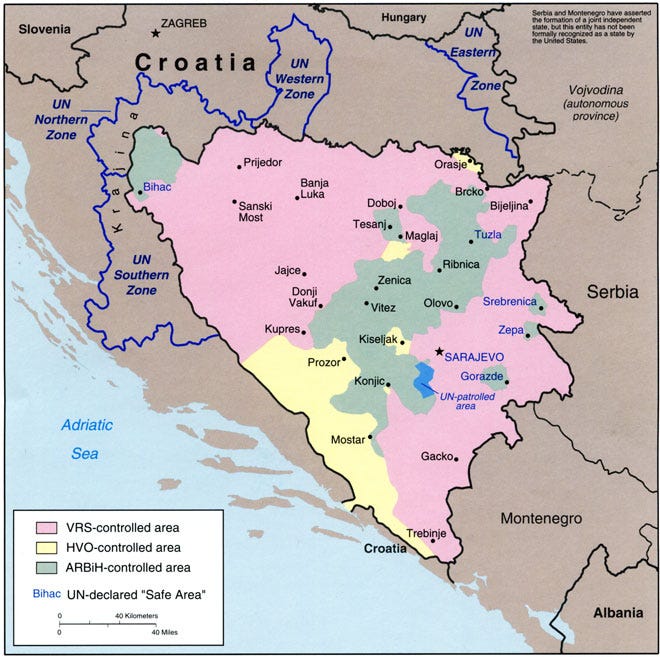
Meanwhile, as the failure of the Contact Group Plan undermined the realization of the ‘Greater Serbia’ project in gradual stages, Serbian President Milošević decides to persuade the international community to lift the sanctions on the Federal Republic of Yugoslavia.
First of all, Milošević removes Vojislav Šešelj’s parliamentary immunity and has him arrested. The leader of the Serbian Radical Party has been a persistent thorn in Milošević’s side, especially after accusing him of orchestrating ethnic cleansing in Bosnia.
Secondly, Milošević accepts the deployment of 135 UN inspectors to monitor the border between the Federal Republic of Yugoslavia and the Federation of Bosnia and Herzegovina, following the closure of the border with Republika Srpska in early August.
The members of the Contact Group (the United States, Russia, France, the United Kingdom and Germany) consider Milošević’ actions as tangible evidence of his commitment to the negotiation process for pacifying the region.
On September 23, the UN Security Council approves two resolutions with diametrically opposed objectives.
Resolution 942 introduces economic sanctions against Republika Srpska and severs all diplomatic ties with its political representatives. Resolution 943 temporarily suspends part of the sanctions (for 100 days) imposed against Belgrade since May 1992.
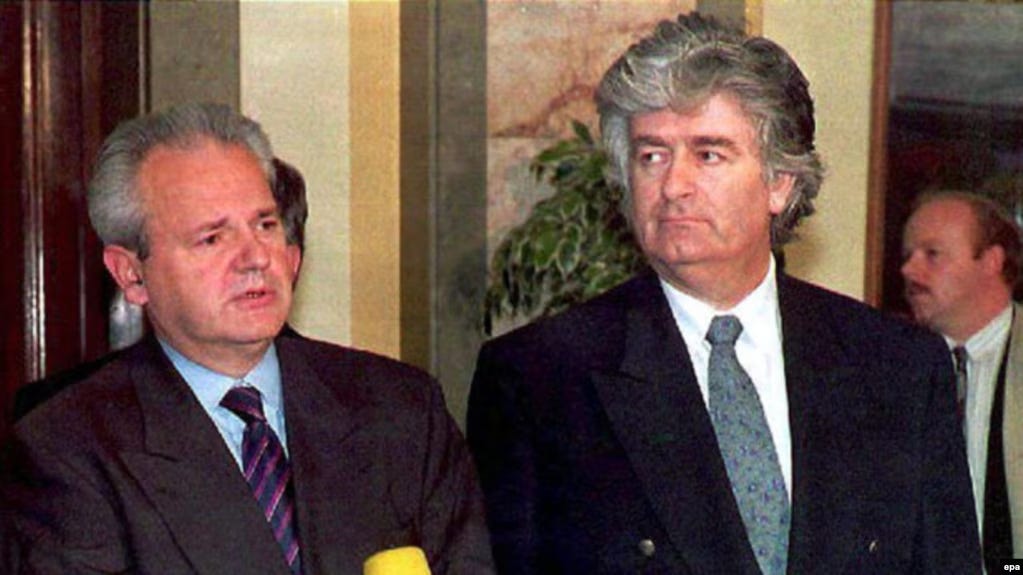
The support of readers who every day gives strength to this project - reading and sharing our articles - is essential to realize all that you have read and listened to, and even more.
If you know someone who can be interested in The Yugoslav Wars podcast, why not give them a gift subscription?
Behind every original product comes an investment of time, energy and dedication. With your support BarBalkans will be able to elaborate new ideas, interviews and collaborations.
Here is the archive of The Yugoslav Wars:
Here you can find a summary of the past years:

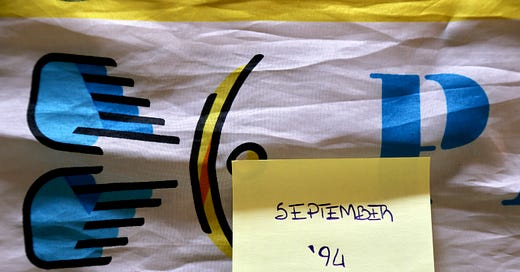







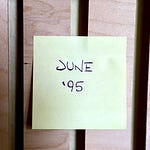
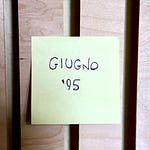
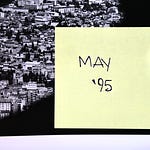
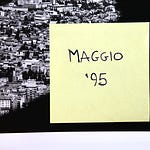

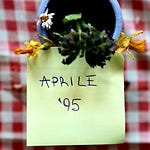
Share this post